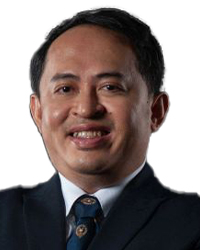Pursuant to heightened calls to reduce greenhouse gas (GHG) emissions and to increase the use of renewable energy, the present Philippine administration has recently implemented key reforms affecting the sector.
LIFTING NATIONALITY RESTRICTIONS
In September 2022, the Department of Justice (DOJ) issued DOJ Opinion No. 21, which held that the 40% foreign equity limitation under article XII, section 2 of the 1987 Philippine Constitution shall not apply to solar, wind, hydro and ocean, or tidal energy resources, which are deemed as inexhaustible natural resources.
Not long after the issuance of the DOJ opinion, the Department of Energy (DOE) issued Department Circular No. 2022-11-0034, lifting the foreign equity limitation in the renewable energy sector in line with the DOJ issuance.
Pursuant to DOJ Opinion No. 21 and DOE Department Circular No. 2022-11-0034, foreign renewable energy developers may now be allowed to undertake renewable development through renewable energy service (or operating) contracts in excess of the 40% foreign equity limitation prescribed under the 1987 Philippine Constitution.
Notably, there has been no case so far filed challenging the validity of DOJ Opinion No. 21 and DOE Circular No. 2022-11-0034.
Absent a decision of the Philippine Supreme Court in an actual case or controversial ruling on the validity and constitutionality of these administrative issuances, these policies stand and foreign investors may rely on them.
GREEN ENERGY AUCTION

Peralta-Loriega
Founding and co-managing partner
Email: meploriega@sl-lawoffice.com
The Green Energy Auction Programme (GEAP) is a market development support programme introduced by the DOE aimed to support the government’s efforts in increasing the share of renewable energy in the Philippines, and increasing private sector participation in renewable energy generation.
Through the GEAP, the government can auction off a limited number of megawatts to renewable energy suppliers annually.
Renewable energy developers qualified to participate in the GEAP must have no legal impediments, which include having existing power purchase agreements or purchase supply agreements with any distribution utility or any end user. All qualified suppliers may register their intention to participate in the auction with the Green Energy Auction Committee (GEAC), which shall declare the winning bidders after the auction.
Any distribution utility then would have the option to procure energy from the GEAP pool of winning bidders. Auction rounds are conducted via an electronic bidding platform operated by the DOE. A Green Energy Auction Reserve Price (GEAR price) is set by the Energy Regulatory Commission, which shall be the maximum price offered in Philippine pesos per kWh. The GEAR price varies depending on the type of renewable energy resource.
The DOE conducted the first round of the GEAP in June 2022, with 1,866.13MW of renewable energy (solar, biomass, wind, and hydropower) auctioned off. In July 2023, 3,440.756MW of renewable energy (solar and wind) was auctioned off in the second round.
The auction for the third round (GEA-3) has been set for 21 August 2024 to push for the increased use of renewable energy and attainment of energy security and reliability. The GEA-3 will cater to both: (1) Non-feed-in-tariff (Non-FIT) eligible renewable energy technologies (geothermal, impounding hydro and pumped-storage hydro); and (2) FIT-eligible renewable energy technology (run-of-river hydro).
STRENGTHENING CARBON CREDIT

Senior partner
Email: basanjuan@sl-lawoffice.com
The global carbon market has experienced substantial interest in recent years. A report by the Asian Development Bank (ADB) on National Strategies for Carbon Markets under the Paris Agreement explains carbon markets as mechanisms that enable participating entities such as governments and private companies to trade GHG emission reductions and carbon credits, internationally or domestically.
A carbon market can either be a compliance market or a voluntary market. The compliance market is regulated by national, regional or international reduction regimes, and is used by governments and companies that, by law, have to account for their GHG emissions. This market usually covers energy-intensive enterprises and sectors.
In the EU, for example, energy-intensive sectors involved in oil and gas must participate in the EU Emissions Trading System. In contrast, the exchange of carbon credits in the voluntary market is not legally required or regulated. It is done on a voluntary basis outside of compliance markets, where private companies seek to voluntarily offset their emissions.
At present, the Philippines has yet to establish an enabling law that will serve as a framework for governing carbon markets. While previous efforts to strengthen carbon trade were initiated pursuant to the Clean Development Mechanism of the Kyoto Protocol under the UN Framework Convention on Climate Change, these efforts have yet to result in the passage of local legislation.

Cantre Jr
Senior partner
Email: rncantre@sl-lawoffice.com
The lack of an enabling law notwithstanding, in 2021, the Philippine Department of Environment and Natural Resources (DENR) issued Administrative Order No. 43, which established a carbon accounting, verification and certification system for forest carbon projects to encourage and support investments in carbon sequestration activities.
This DENR administrative order, however, has been criticised for failing to establish comprehensive parameters for carbon credits. In 2022, DENR Secretary Maria Antonia Yulo-Loyzaga announced a legislative initiative to institutionalise a carbon credit system as part of its efforts to strengthen existing environmental laws.
In March 2023, House Bill No. 7705, or the Low Carbon Economy Act of 2022, was filed to encourage a just transition to a low-carbon economy and support the country’s national development objectives and priorities. The bill introduces the Philippine Greenhouse Gas Inventory Management and Reporting System, with the Climate Change Commission (CCC) in charge as the overall lead in its implementation.
House Bill No. 7705 will also allow for the trading of carbon credits to cushion the impact of the annual GHG emissions cap, which under the proposed law shall be set for covered entities by the DENR on the recommendation of the Nationally Determined Contribution steering committee, and in consultation with the industrial sector. The emissions trading mechanism proposed in the bill will create a pseudo-financial market, as entities with excess GHG emissions can buy allowances from the market, while entities with less GHG emissions may sell their allowances to the market.
While the establishment of a carbon credit system is still in its initial stages, carbon credits have already been referenced in the Public-Private Partnership (PPP) Code of the Philippines, and the Renewable Energy Act (RE Law). Under the PPP Code, PPP projects may be financed through alternative financial instruments including green financing (carbon credits). Under the RE Law, all proceeds from the sale of carbon emission credits shall be exempt from all taxes.
The Philippine government has also entered into agreements with private entities to lay the foundations for the development of a carbon credit system. In February 2023, the DENR entered into an MOU with Marubeni Corporation, Dacon Corporation and the University of the Philippines College of Forestry and Natural Resources to develop a carbon credit programme focused on carbon absorption and sequestration by forests.
Another MOU was entered into in November 2023 between the CCC, Maharlika Carbon Technologies and LMC Consultancy. Under this MOU, Maharlika Carbon and LMC will assist the Philippines in setting up its carbon registry, and enable the Philippines to participate in the trading of sovereign carbon credits and voluntary carbon credits.
In 2024, the DENR plans to further develop the Philippines’ carbon policy framework and implement programmes in partnership with institutions such as the UN Development Programme (UNDP), the ADB and the World Bank. In particular, the DENR intends to launch the country’s registry and platform for carbon credits and is working with the ADB and the UNDP to encourage foreign investment in voluntary carbon markets. In parallel, the Department of Finance is working with the World Bank to explore the feasibility of carbon pricing instruments and the development of policies on pricing and carbon taxes.
Pending the enactment of a law that will provide a more stable framework for regulation, the above-mentioned initiatives are concrete steps in the right direction to operationalise a carbon market framework. Proper policy guidance and institutional mechanisms must be established to regulate how carbon credits will be traded, sold and purchased. Given its vast potential for growth, private investors are closely monitoring the developments in the field of carbon credits in the Philippines.
The above-mentioned discussions are not meant to be exhaustive. Parties to transactions related to renewable energy should seek professional advice to ensure full regulatory compliance.

29th Floor, Discovery Centre Bldg, 25 ADB Avenue,
Ortigas Center, Pasig City, Philippines 1600
Tel: +632- 7-798-8115
Email: info@sl-lawoffice.com
www.sl-lawoffice.com






























